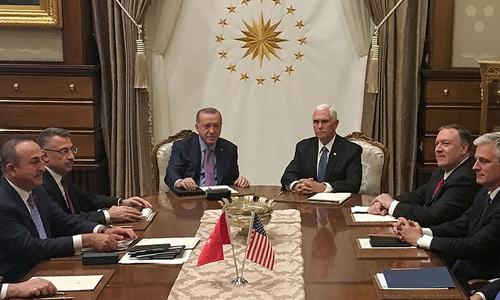US sanctions Nato ally Turkey over purchase of Russian defence system

The United States imposed long-anticipated sanctions on Turkey on Monday over Ankara's acquisition of Russian S-400 air defence systems, further complicating already strained ties between the two Nato allies.
Turkey condemned the sanctions as a “grave mistake” and urged Washington to revise its “unjust decision”. It said sanctions would inevitably harm mutual relations and threatened unspecified retaliatory steps.
Senior US officials said in a call with reporters that Ankara's purchase of the S-400s and its refusal to reverse its decision, despite repeated pleas from Washington, left the United States with no other choice.
The sanctions, first reported by Reuters last week, target Turkey's top defence procurement and development body Presidency of Defence Industries (SSB), its chairman Ismail Demir and three other employees.
The measures, which received a bipartisan welcome from the US Congress, were announced under the Countering America's Adversaries Through Sanctions Act (CAATSA) — the first time the act has been used against a fellow member of the Nato alliance.
Turkey's lira rallied about one per cent as Washington opted not to adopt broader sanctions but analysts said the move was still likely to weigh on the Turkish economy, already in a coronavirus-induced slowdown and with double-digit inflation.
Ankara acquired the Russian S-400 ground-to-air defences in mid-2019 and says they pose no threat to Nato allies. But Washington has long threatened sanctions and last year removed Turkey from an F-35 jet programme.
Ignoring the advice of aides, US President Donald Trump had resisted imposing penalties on Turkey until giving the green light several days ago, sources familiar with the matter said.
“The United States made clear to Turkey at the highest levels and on numerous occasions that its purchase of the S-400 system would endanger the security of US military technology and personnel and provide substantial funds to Russia's defence sector,” US State Secretary Mike Pompeo said.
Briefing reporters, Christopher Ford, assistant secretary of state for international security and non-proliferation, said Washington had sought a solution but Ankara rejected all offers.
“This is not a step we've taken lightly or certainly quickly,” he said.
Turkey says it has repeatedly proposed forming a joint working group with the United States and Nato to resolve the issue but its offers have not been fully utilised.
The sanctions, near the end of Trump's presidency, are likely to weigh on Ankara's ties with Democrat Joe Biden's administration when he takes over as president next month.
Chilling effect
The sanctions will block joint projects or technology transfers between US companies and Turkish firms linked to SSB, said former Turkish diplomat Sinan Ulgen, who heads the Istanbul-based Centre for Economics and Foreign Policy Studies think tank.
They also impose restrictions on loans and credits by US financial institutions to SSB totalling more than $10 million, while imposing asset freezes and visa restrictions on the SSB president and three other employees.
It is not immediately clear what impact the sanctions will have on third countries such as European states that supply arms or defence components and work with Turkish defence firms.
“Turkey's defence industry will be under stress for a while,” said Ozgur Unluhisarcikli, from the German Marshall Fund in Ankara.
“Whether there is a secondary sanctions aspect or not, it will have a chilling effect on third countries as well.”
But he said the impact on the wider economy would be less severe and it was “very good that the uncertainty is being removed” after sanctions had loomed for so long.
US senators, both Republican and Democratic, hailed the move. Animosity against President Tayyip Erdogan in the US Congress has deepened over the past year, a phenomenon Biden will have to consider when dealing with Ankara.
“After watching President Trump repeatedly refuse to hold Turkey and President Erdogan accountable, I'm glad to see this administration finally impose these required sanctions,” Democratic Senator Chris Van Hollen said.
“These measures send a clear message to Erdogan: we will not allow him to undermine our national security and that of our faithful Nato allies without consequence.”













































